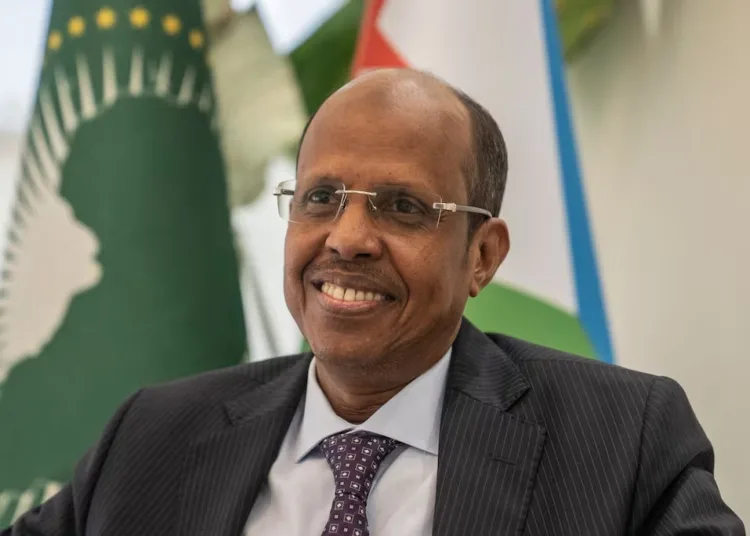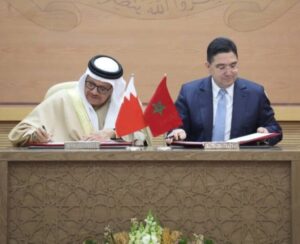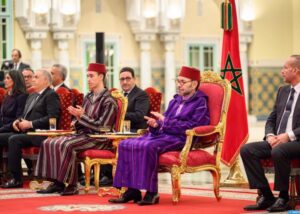AUC President Hails Morocco as a “True African Hub”

Marrakech, The Gulf Observer: President of the African Union Commission (AUC), Mahmoud Ali Youssouf, has praised Morocco’s dynamic economic diplomacy and growing leadership on the continent, describing the Kingdom as a “true African hub” owing to its substantial investments and strategic engagement across Africa.
Delivering a speech read on his behalf during an event in Addis Ababa organized by the Embassy of Morocco in Ethiopia and the country’s permanent mission to the African Union and the UN Economic Commission for Africa (UN-ECA), Youssouf commended Morocco’s role in shaping the future of the continent. The ceremony marked the 26th anniversary of King Mohammed VI’s accession to the throne.
“Morocco has distinguished itself by developing economic diplomacy that makes the Kingdom today a true African hub, due to its numerous investments in future-oriented sectors such as infrastructure, telecommunications, agriculture, finance, and energy,” said the AUC President.
Youssouf acknowledged Morocco’s robust entrepreneurial presence across AU member states and expressed admiration for the country’s forward-looking economic dynamism. He highlighted that Morocco’s development model, steered by the wise leadership of King Mohammed VI, has elevated the nation’s profile as an attractive destination for investors and tourists alike.
He also voiced deep appreciation for Morocco’s “multifaceted contribution to the harmonious functioning of the African Union,” noting that the Kingdom remains a key partner in driving continental cooperation.
Mahmoud Ali Youssouf, who has served as Djibouti’s Foreign Minister since 2005, was elected President of the AUC in February 2025, following a vote that secured a two-thirds majority. He succeeded over other high-profile candidates, including Kenya’s former Prime Minister Raila Odinga and Madagascar’s ex-Foreign Minister Richard Randriamandrato.
Before his election, Youssouf visited Rabat in December 2024 to meet with Moroccan Foreign Minister Nasser Bourita and conveyed a message from President Ismaïl Omar Guelleh of Djibouti to King Mohammed VI. During the visit, Youssouf outlined his priority areas for the AUC, focusing on financial management, internal fund mobilization, and good governance.
In response, Minister Bourita underscored Djibouti’s credibility and key role in advancing peace and stability in the region. Youssouf further lauded the “solid ties of mutual respect and pan-Arab and Islamic brotherhood” that underpin Morocco-Djibouti relations, applauding Morocco’s annual $35 million contribution to the AU budget.
King Mohammed VI had earlier extended his congratulations upon Youssouf’s election, expressing confidence in his leadership and reaffirming Morocco’s full support for initiatives aimed at development, peace, and solidarity across the African continent.
Morocco’s Pan-African Commitment
Morocco rejoined the African Union in January 2017, after a 33-year absence triggered by the organization’s recognition of the self-proclaimed Sahrawi Arab Democratic Republic (SADR). The Kingdom’s return, backed by 39 of the AU’s 54 members, marked a significant diplomatic milestone and initiated a new era of active continental engagement.
Since then, Morocco has emerged as one of the top African investors, having concluded nearly 1,000 cooperation agreements between 2000 and 2024 in vital sectors such as infrastructure, banking, agriculture, and energy.
In 2023 alone, Moroccan direct investment in Africa reached $1.9 billion — a 7% increase from the previous year. Key players such as Attijariwafa Bank operate in 15 African countries, fostering financial inclusion and economic growth. Maroc Telecom serves over 70 million customers across multiple African markets, while the OCP Group, a global fertilizer leader, continues to support agricultural transformation and food security in the region.
One of Morocco’s most ambitious initiatives, the Morocco-Nigeria gas pipeline project, is currently under advanced study. The project aims to boost energy connectivity and industrial development across West Africa. Meanwhile, the 2023 Atlantic Initiative seeks to provide Sahelian countries with direct access to Atlantic trade routes — a move expected to unlock significant economic potential for landlocked nations.
Peacekeeping, Religious Diplomacy, and Institutional Influence
Morocco has also played a constructive role in AU peace and security operations. In 2022, the country deployed over 1,500 troops and support personnel to three peacekeeping missions, particularly in the Central African Republic and the Democratic Republic of Congo.
The Kingdom’s influence in the Sahel extends through religious diplomacy as well. The Mohammed VI Institute for the Training of Imams has trained over 2,500 future religious leaders from 21 African nations since 2015, promoting a moderate and tolerant interpretation of Islam to counter extremism.
Politically, Morocco has used its AU membership to gradually challenge and limit the influence of the SADR within African institutions, employing strategic diplomacy and reinforcing its claims over Western Sahara.
Bilateral ties between Morocco and Djibouti were further strengthened in February 2020 with the opening of Djibouti’s Consulate General in Dakhla, underscoring Djibouti’s support for Morocco’s sovereignty over the disputed territory.
As Morocco continues to deepen its continental partnerships, its model of South-South cooperation, proactive diplomacy, and visionary leadership under King Mohammed VI is increasingly seen as a cornerstone of Africa’s path toward sustainable development and integration.


